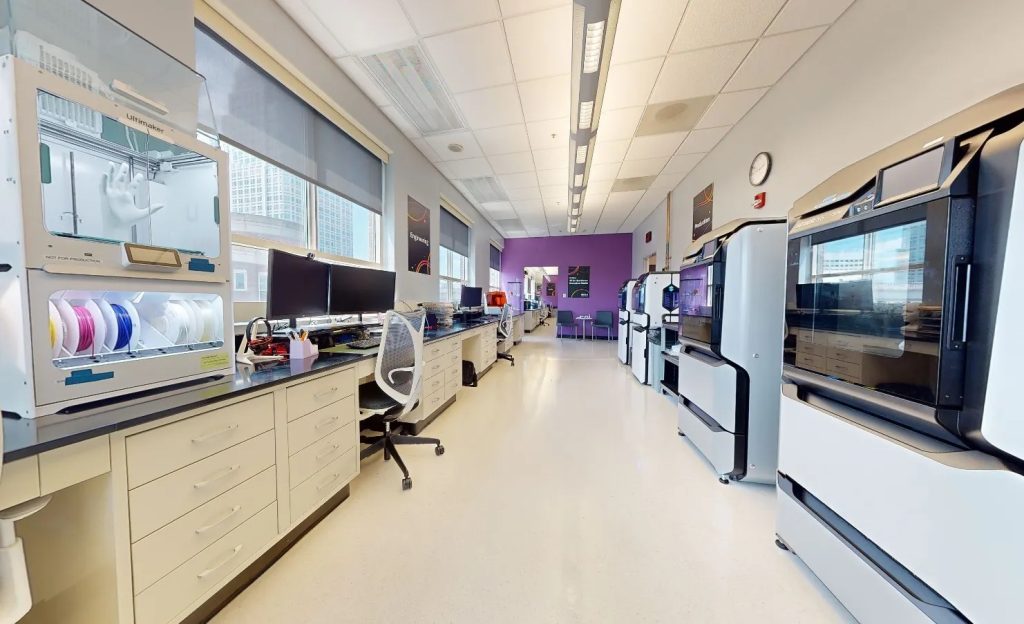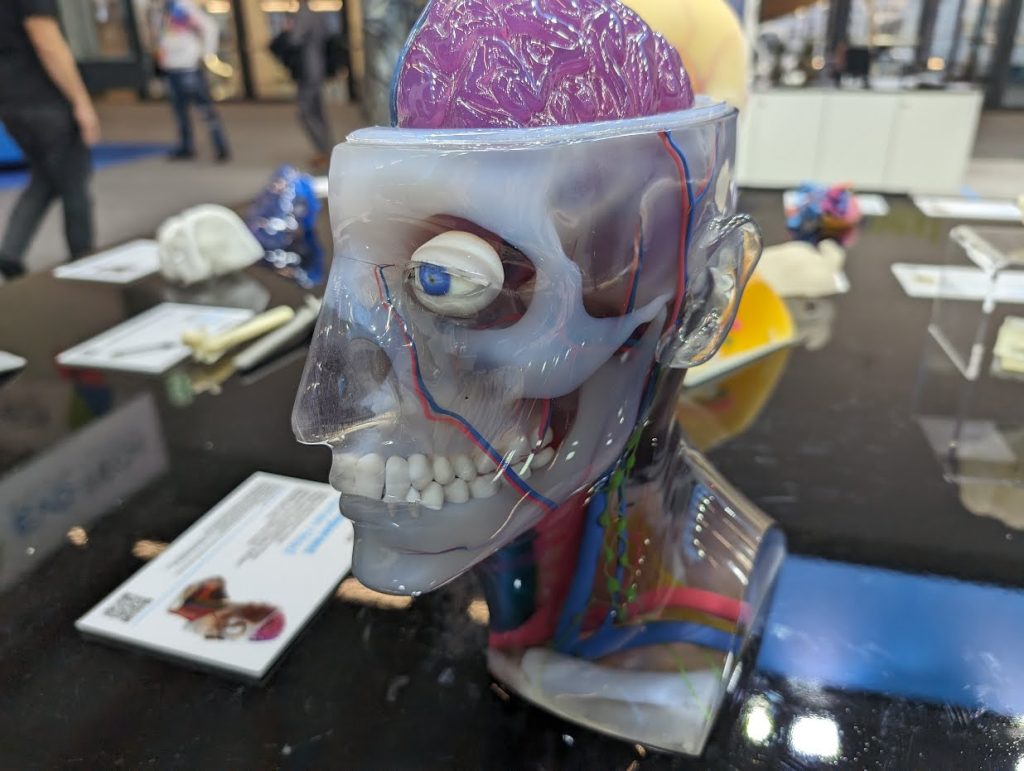Digital services company Ricoh USA has launched the RCOH 3D for Healthcare Innovation Studio, its new point-of-care additive manufacturing facility.
Based at Atrium Health Wake Forest Baptist, a medical center in North Carolina, the facility provides clinicians direct access to development, design and manufacturing capabilities for 3D printing FDA-approved anatomic models. The patient-specific devices can be used for surgical planning and patient education.
The company claims that its on-site additive manufacturing capabilities will reduce operating times, lower medical costs, improve diagnostic support, and alleviate FDA-compliance concerns.
According to Ricoh, surgeons using 3D printed anatomical models have achieved average operating time savings of 62 minutes, and a 7.8% reduction in operative time.
In the future, Ricoh plans to open additional Point of Care medical device 3D printing facilities. In an interview at Formnext 2023 Gary Turner, Ricoh USA’s Managing Director, outlined the company’s vision to increase the accessibility of personalized anatomic models for surgeons.
“As we look to integrate and scale Point of Care facilities within health systems nationally, we’re extremely grateful that Atrium Health Wake Forest Baptist has partnered with us to make the first facility a reality, and we look forward to growing 3D production within their network and in other hospital systems across the country,” commented Turner in a Ricoh press release.
 Ricoh’s new medical 3D printing Innovation Studio. Photo via Ricoh.
Ricoh’s new medical 3D printing Innovation Studio. Photo via Ricoh.
Ricoh’s new healthcare 3D printing facility
According to Ricoh, patient care teams often encounter workflow disruptions, lead-time delays, and regulatory compliance issues when acquiring patient-specific anatomic models. This negatively impacts patient care.
To overcome these challenges, the company’s new Innovation Studio incorporates its medical 3D printing ecosystem and quality management system to produce personalized, FDA-cleared medical devices at the point of care.
Rico’s facility will likely feature 3D printing hardware and materials from 3D printer manufacturer Stratasys. Last year, the two companies announced a partnership to provide on-demand 3D printed anatomical models for clinical settings.
Stratasys’ Patient-Specific 3D Solutions combines its J850 Digital Anatomy 3D printer with Ricoh’s precision additive manufacturing services and Axial3D‘s Segmentation-as-a-Service solution.
The new facility will fabricate patient-specific anatomic models using segmented 3D print files produced directly from medical imaging data. The models will be adopted for diagnostic purposes in craniomaxillofacial, orthopedic, cardiovascular, neurological, gastrointestinal, genitourinary, and breast applications.

3D printed anatomical models enhance patient outcomes
Ricoh’s new in-hospital center will reportedly facilitate faster production times and direct access to clinical resources and 3D printing capabilities. This will enable clinical teams to plan and provide care plans that are timely and informed. According to Ricoh, 50% of surgeons redefined their surgical approach when a 3D printed model was used during the planning stage.
The new additive manufacturing capabilities are expected to reduce costs, with 3D printed models generally enabling $3,720 in savings per case.
Manufacturing on Demand
3D printed models also facilitate cadaver-free training and can be used to educate patients when discussing informed consent. Ricoh claims they can provide more accurate insights into patient anatomy, resulting in better-informed approaches to procedures and care.
The new Innovation Studio is advertised as bolstering multidisciplinary collaboration across national networks. This will allow patients to draw on a wider pool of experts to support their treatment.
Ricoh’s Managed Services platform and FDA 510(k)-cleared anatomic models will also ensure that manufacturing facility, regulatory and legal compliance requirements are met.
Christopher T. Whitlow, professor and chair of radiology at Wake Forest University School of Medicine, believes this partnership will “allow our health system and medical school to continue to elevate our clinical, research and education capabilities.”
Atrium Health Wake Forest Baptist and Wake Forest University School of Medicine will now work to create a Medical 3D Printing Center of Excellence. This will be developed in collaboration with Wake Forest Innovations and Innovation Quarter.
3D printing realistic medical models
Ricoh’s new innovation studio is the latest example of 3D printing’s growing role in realistic anatomical model production.
Previously, medical technology company Biomodex launched a 3D printed heart model to support training for the transseptal puncture procedure. The anatomical model was designed to feel, geometry, and haptic feedback of real heart tissue, enabling electrophysiologists and cardiologists to practice in a more realistic environment. The model is also ultrasound-compatible, meaning it can be used in ultrasound-guided practice procedures.
Similarly, researchers from Nottingham Trent University (NTU) recently developed lifelike 3D printed lung and heart models that can bleed, beat and breathe like the real thing. Designed for organ transplant training, they mimic the tactile qualities of a human heart and can be produced with various tissue hardness levels.
The models allow medical professionals to plan surgeries, and research and teach transplant procedures, without the risk of complications. The 3D printed hearts feature bleeding vessels and the pericardium. This allows trainee surgeons to accurately simulate stemming blood flow, an essential step before making incisions and removing diseased organs.
You might also like:
Ronawk partners with B9Creations to unlock the potential of 3D bioprinting with Bio-Blocks: Advanced Tissue Mimetic Technologies company Ronawk has partnered with B9Creations to develop and mass-produce 3D bioprinted hydrogels leveraging Ronawk’s Bio-Blocks.
* This article is reprinted from 3D Printing Industry. If you are involved in infringement, please contact us to delete it.
Author: Alex Tyrer-Jones

Leave A Comment